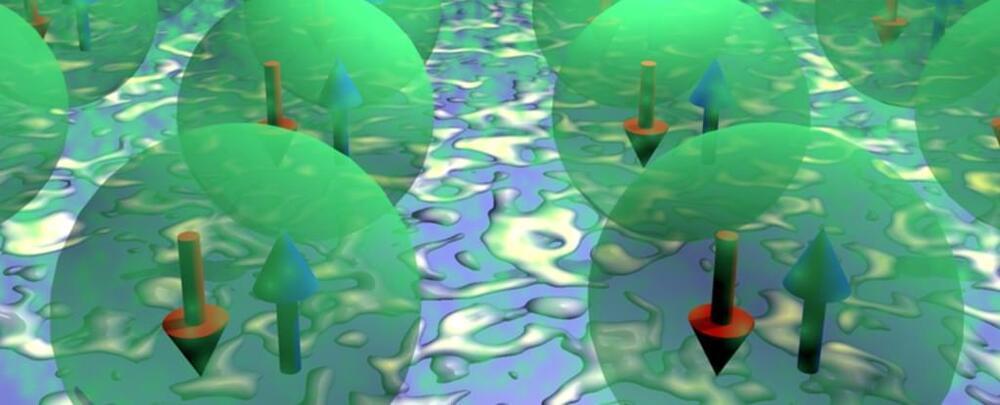Membrane material improves power generation from hydrogen gas — and catalyses the gas’s production from water.



Crafting organic molecules into a bizarre kind of magnet, physicists from Aalto University and the University of Jyväskylä in Finland have created the perfect space for observing the elusive activity of an electronic state called a triplon.
Where a garden variety magnet is typically best described as having two poles surrounded by a nest of field lines, the curious construct known as a quantum magnet defies such a simple description.
As is the case any time the word ‘quantum’ appears, you can imagine a landscape where nothing is certain. Like spinning roulette wheels in a dimly lit casino, all states are a maybe until the croupier says “no more bets”.

A newly observed isotope of oxygen is defying all our expectations for how it should behave.
It’s oxygen-28, with the highest number of neutrons ever seen in the nucleus of an oxygen atom. Yet, while scientists believe it should be stable, it decays rapidly – calling into question what we thought we knew about “magic” numbers of particles in the nucleus of an atom.
The nucleus of an atom contains subatomic particles called nucleons, consisting of protons and neutrons.


Stem cells can be classified based on their ability to specialize. Totipotent stem cells can become any tissue in the body, pluripotent stem cells can become any cell type except for a complete organ, and multipotent stem cells can only differentiate into specific tissue types.
Induced pluripotent stem cells (iPSCs) show promise in treating retinal degenerative diseases. They are created by reprogramming adult cells using Yamanaka factors, allowing them to revert to an embryonic state. These cells provide a virtually unlimited cell source for research and potential therapies.
Scientists are researching several diseases and drug development applications for these cells, highlighting the characteristics that make them an ideal therapy for macular degeneration.

“Personalize or Perish.” One of the leading newspapers aptly summarizes the critical nature of personalization 2.0, or hyper-personalization for businesses.
We live in an era where customers expect businesses to understand their wants and needs. Today, companies must meet customers’ needs and anticipate and exceed them. And for this, they must pivot to a digital-first mindset to create stronger, more authentic customer interactions.
How do they do this? Through a hyper-personalized, AI-powered business strategy where products, ads, and interactions are tailor-made for each customer or a group of customers.

There is a joke about the daughter who asks her dad why he speaks so quietly around the house. “Because there is artificial intelligence everywhere that is listening to what we say,” the dad replies. The daughter laughs, the father laughs. And Alexa laughs.
Artificial intelligence does seem to be injecting itself into more and more aspects of our lives. And as AI brains earn the equivalent of a million doctoral degrees while absorbing trillions of bits of data and in turn generate responses with an engaging tone and demeanor that sound as simple and humanlike as your favorite old college professor, some feel compelled to ask: Are computers becoming sentient?
A cynic would respond, “Of course not. Computers may solve problems in seconds that would take humankind generations to solve, but they can’t feel love and pain, can’t see and appreciate the moon and the stars, can’t smell the coffee we spill on the keyboard.”

Researchers from Queen Mary University of London have made a discovery that could change our understanding of the universe. In their study published on August 23 in the journal Science Advances.
<em>Science Advances</em> is a peer-reviewed, open-access scientific journal that is published by the American Association for the Advancement of Science (AAAS). It was launched in 2015 and covers a wide range of topics in the natural sciences, including biology, chemistry, earth and environmental sciences, materials science, and physics.

Apptronik, a robotics company, has unveiled Apollo, a humanoid robot designed to support humans by undertaking hazardous or less desirable tasks, thereby enhancing human safety. Apollo stands out as a leading commercial robot, emphasizing friendly interaction, efficient manufacturing, substantial payload capabilities, and a strong focus on safety.

Researchers have pioneered a 3D-SPI method that allows high-resolution imaging of microscopic objects, presenting a transformative approach for future biomedical research and optical sensing.
A research team led by Prof. Lei Gong from the University of Science and Technology (USTC) of the Chinese Academy of Sciences (CAS) and collaborators developed a three-dimensional single-pixel imaging (3D-SPI) approach based on 3D light-field illumination(3D-LFI), which enables volumetric imaging of microscopic objects with a near-diffraction-limit 3D optical resolution. They further demonstrated its capability of 3D visualization of label-free optical absorption contrast by imaging single algal cells in vivo.
The study titled “Optical Single-Pixel Volumetric Imaging by Three-dimensional Light-Field Illumination” was published recently in the journal Proceedings of the National Academy of Sciences (PNAS).